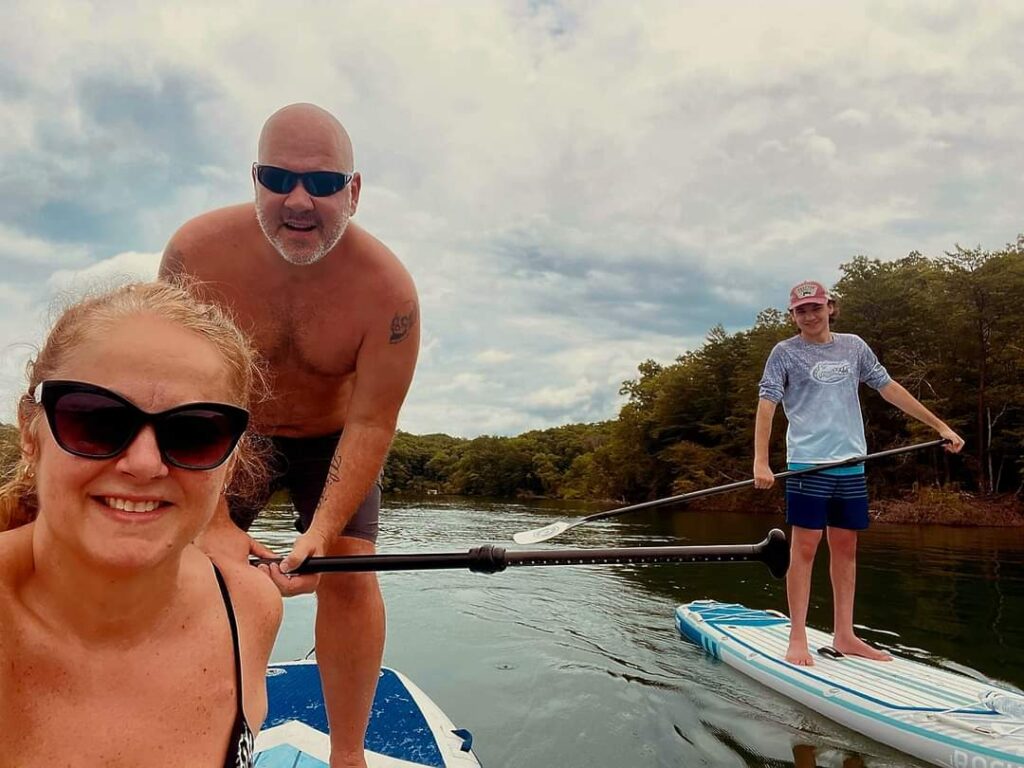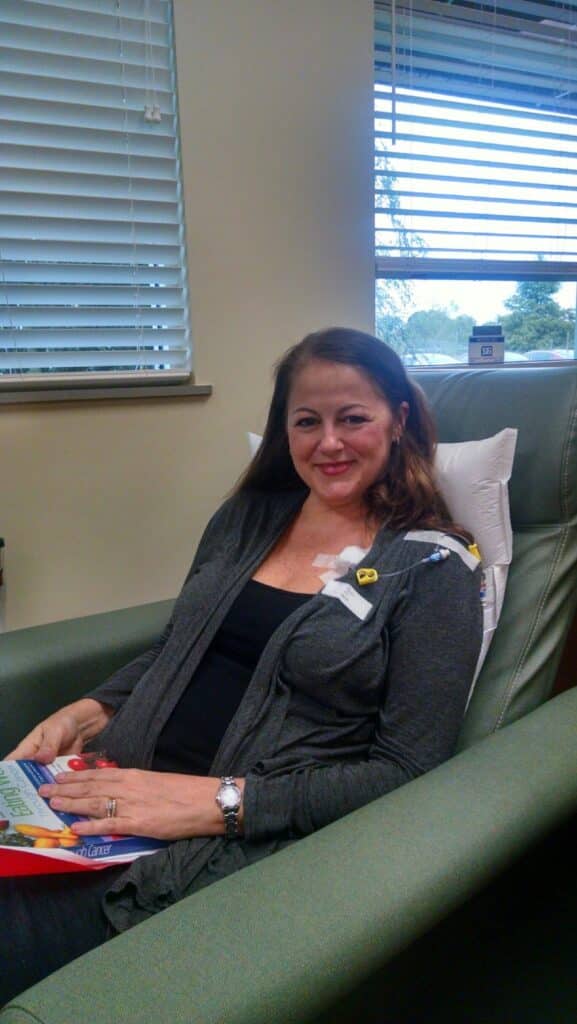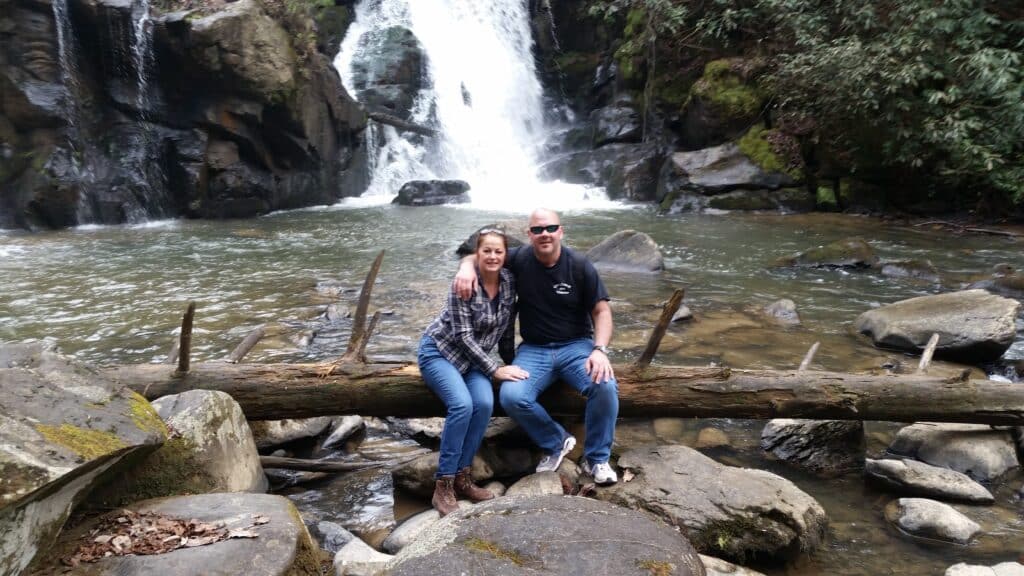A Husband’s Devotion as His Wife Faced Lymphoma

In 2015, Alex Wald, his wife, Alicia (Ali), and their 12-year-old son, Luke, were living a busy life in Crystal Beach, Florida, a picturesque beach town with shell-lined streets about 45 minutes outside of Tampa. Life was good.
“Back then, we were living the most normal existence you can imagine as a middle-of-the-road family,” said Alex. “I had a career in law enforcement, and Ali was working as a senior executive at a real estate development firm. Things were humming along, and we were happy, doing our work and raising our son — things were great.”
Then, in the summer of 2015, Ali started experiencing swelling in her abdomen. Initially, she thought it might be an abdominal obstruction and figured it would go away on its own. However, instead of going away, it slowly worsened over the next few weeks, until one day, Ali began taking on water weight and was in a great deal of pain. Her appearance had changed dramatically almost overnight due to the swelling. There was no putting it off any longer — Alex and Ali had to go to the emergency room.
“We initially thought it would be simple, something quickly fixed,” said Alex. “We just wanted to get to the bottom of it.”
In the emergency room, the staff saw that Ali was in distress and took her to be examined immediately. The doctor ordered a scan, and within an hour, he said that it looked like advanced cancer all over her abdomen.
An oncologist came to see Ali that evening and ordered paracentesis, a medical procedure that drains excess fluid from the abdominal cavity. Ali’s pressure was so great that her internal organs had been displaced. Over the next few days, the hospital removed six liters of fluid from Ali’s abdomen. After more tests, on September 7, 2015, just days after being admitted to the emergency room, Ali was officially diagnosed with follicular lymphoma (FL).
“I will remember that day forever,” said Alex. “It felt like a bucket of cold water in the face. I don’t think anybody’s ready to hear they or their loved one has cancer — we certainly weren’t. I remember thinking then and there that everything had just changed.”
Follicular lymphoma, is usually a slow-growing or indolent form of non-Hodgkin lymphoma (NHL) that arises from B-lymphocytes, which make it a B-cell lymphoma. Due to its slow-growing nature, symptoms can take a while to present themselves, and by then, the lymphoma can be well advanced. Follicular lymphoma accounts for 20%- 30% of all NHL cases. While generally not considered to be curable, follicular lymphoma is characterized more as a chronic disease, and patients can live for many years with this type of lymphoma.

Assuming the Role as a Care Partner
Upon receiving Ali’s diagnosis, Alex immediately began researching the disease and her options. Ali’s oncology team initially wanted to put her on a regimen called R-CHOP, but after taking Ali’s relative youth and strength into account, they decided to try a less aggressive treatment regimen combining Treanda and rituximab — an emerging frontline treatment that was proving to be effective while milder on the body.
“I’m a researcher by nature, and I read nonstop,” said Alex. “I had never even heard of follicular lymphoma before Ali’s diagnosis, but I knew it was time to put my head down and get to work. After researching the suggested treatment, we agreed that this would be the path for us.”
Alex was an active participant in Ali’s care throughout her lymphoma journey, attending and taking notes at every doctor’s appointment and every treatment.
“I told Ali, ‘Look, I got this,’” said Alex. “‘You’re going to do the fighting; I’m going to take care of all the research, logistics, and everything else.’ So I just dove in.”
With all the conflicting sources of information online, Alex found it difficult to discern what information was real and helpful to them — until he found the Lymphoma Research Foundation.
“There’s so much information online — but you don’t know what’s real, what isn’t, and the motivation behind it, so you have to sift through it all and find who’s credible and what makes the most sense,” said Alex. “The Lymphoma Research Foundation was an invaluable resource for us — not only providing us with up-to-date information but also giving us hope by sharing stories of others who were diagnosed with Ali’s type of lymphoma and who have gone on to live full lives for many years post-diagnosis.”
Alex found that getting so involved with Ali’s treatment helped him feel more hopeful and took his mind off the situation he and his family found themselves in.
“Telling my son what was happening to his mom was tough, but we tried to reassure him that we were going to do everything we could so that mom would be fine. But there’s no easy way to do it,” said Alex. “There’s probably no easy way for a child to receive that kind of news either, but how you package the news is equally important.”
Ali had six treatments — one each month — which she sailed through with relatively minor side effects. After the third treatment, her doctor wanted to take a scan to see how her body was responding.
“The evening after Ali had been scanned, I remember standing in the middle of our bedroom at about 9 o’clock at night when the doctor called,” said Alex. “He told us that her scans looked great, and it looked like the cancer was already gone. We couldn’t believe it — I don’t think I’ve ever had that feeling of elation before. We were just so relieved and unbelievably happy.”

Inspiring Hope in Others
Once Ali’s lymphoma was under control, Alex began volunteering with the Foundation’s peer support program, the Lymphoma Support Network (LSN), to help others navigate the challenges that come with facing a lymphoma diagnosis. The LSN is a one-to-one peer support program connecting patients and care partners with volunteers who have had similar experiences. More than 6,000 lymphoma survivors and their care partners have joined the LSN to connect with others, share their personal histories as they relate to lymphoma, and offer emotional support.
“As a care partner, one of the biggest challenges is assuming the emotional burden of everything that is happening all around you — it can be a lot,” said Alex. “I did everything I could to keep Ali from worrying about things, but there’s a lot of worry there. Friends and family were constantly asking for updates on how she was doing, so I served as the point person on those communications, which was tough at times when I was worried myself.”
Alex credits Ali’s bravery and fighting spirit for enabling him to focus on the details of being a care partner, from meal prep to making sure Ali made it to each of her doctor appointments.
“Ali made it easy for me — she really did,” Alex said. “After that first night in the hospital, she told me that she had her little cry that night, and now it was time to fight. That inspired me so much — here she was facing this rare disease, and she showed this kind of inner strength that blew me away.”
Alex did everything he could to keep Ali’s spirits high, from simply making her laugh to watching a funny movie or going for a walk down to the pier to look at the water.
As a care partner, Alex remembers those moments and is reminded that realizing that he and Ali were not alone made all the difference. It was those experiences that made him want to get involved with the Lymphoma Support Network.
“It helps to know you’re not alone in something like this, and I encourage anyone facing a lymphoma diagnosis to find some type of community of people that you can talk to who have been through similar experiences,” said Alex. “It may seem small, but talking with someone who’s been there and made it through really goes a long way. I found community through the Lymphoma Research Foundation.”
Alex remembers reading the Foundation’s Stories of Hope and learning about follicular lymphoma on its website, which inspired him to help other people going through what his family did.
Alex looks back at Ali’s diagnosis, treatment, and recovery and can barely believe just how far they’ve come since that first day in the emergency room.
“When I was a kid, if you got cancer, it usually meant that you were probably dying, but it’s not like that anymore,” said Alex. “With the medicines coming out today, some lymphomas are turning into chronic issues, and you can live a full life. We feel so thankful that Ali’s been cancer-free for the past eight years. Thanks to talented researchers and organizations like the Lymphoma Research Foundation, new, more effective treatment options are being developed every day — and that’s encouraging!”
